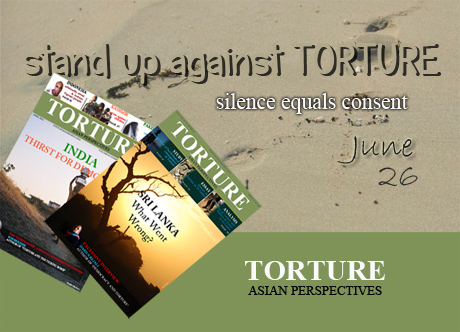(Hong Kong, June 06, 2012) The Asian Human Rights Commission wishes to announce the release of its new bi-monthly magazine, Torture: Asian Perspectives. The first issue will be released on 26 June, on the occasion of the International Day against Torture and Illtreatment.
The magazine is conceived to become an additional space to publish narratives and analysis on torture. Through this, the Editorial Board hope that the victims of torture in Asia would not be forgotten, that their hopes would remain kindled and voices amplified. The publication is one more step by the AHRC in denouncing torture in Asia and to call upon the Asian states to spare no resources to eliminate torture in the continent.

A free and prosperous society encourages public opinion and debates, promotes dissemination of knowledge. The publication, Torture: Asian Perspectives will contribute in nurturing a vibrant Asian society by providing a free space where diverse aspects on the subject – social, medical, physiological, philosophical, political, and legal aspects of torture – are discussed. We hope that this would encourage Asian states to effectively implement legislations against torture in jurisdictions where such legislations exist and will generate enough debates in places where such a law is yet to be drafted.
The increase in the incidents of torture in countries believed to be democratic states is a concern, emerging in post-modern societies. This has gained prominence particularly after the 9/11 terrorist attacks. Professor Darius Rejali, of the Reed College, USA and an expert on the subject, discusses this trend and enumerates the new techniques used to inflict torture in his famous work, “Torture and Democracy.” Professor Rejali traces the migration of “clean torture” techniques – defined as physical torture that leaves no evidence on the victims’ body – from western democracies to authoritarian regimes since the 1970s. According to him “public monitoring leads institutions that favour painful coercion to use and combine clean torture techniques to evade detection, and, to the extent that public monitoring is not only greater in democracies, but that public monitoring of human rights is a core value in modern democracies, it is the case that where we find democracies torturing today we will also be more likely to find stealthy torture.”
Torture is often used by authoritarian regimes as a means to retain control by suppressing dissent. One of the reasons torture is less prevalent in some states in comparison to others is that the states in which torture is less prevalent have open and free political processes that not only protect political opposition but also create checks and balances from any particular political or other group attaining absolute control over the society. Though torture is often used to prevent such limitations to authoritarianism, there are examples throughout the history where social debates have forced political reforms despite the best efforts of whoever was in power. Such reform is present day Asia’s challenge, though Asian history is not bereft of such reforms in the past. A continent that was once home to some of the most advanced and civilised societies has the potential to and must reinvent itself.
The inspiration for Torture: Asian Perspectives is this rich past that contradicts today’s circumstances in the continent. We welcome everyone to come forward to speak-out against torture. Perhaps one way to do so would be to write for the Torture: Asian Perspectives. Anyone wishing to contact the Editorial Board is welcome to do so through email or post. All materials submitted will be independently evaluated according to three separate criteria. They are: the material’s purpose and targeted readers; authority, accuracy and reliability of the author and of the subject discussed; its objectivity and coverage.
The magazine will cover three categories on the issue: individual narratives of torture from Asia; interviews with experts whose work on the subject; and essays covering different perspectives about torture.
Tentative team
Editorial Board:
1. Nilantha Ilangamuwa (Hong Kong, Editor Sri Lanka Guardian)
2. Ms. Answer Styannes (Indonesia, Lawyer)
3. Eric Bailey (USA, Historian/Journalist)
4. Shiv Karan Singh (India, Journalist)
Editorial Advisors
1. John Clancey (Hong Kong, Lawyer)
2. Ms. Kishali Pinto Jayawardena (Sri Lanka, Lawyer)
3. Wong Kai Shing (Hong Kong, Executive Director AHRC)
4. Basil Fernando (Sri Lanka, Director Policy AHRC)
5. Dr J de Almeida Guneratne ( Sri Lanka, President’s Counsel )
6. Ms. Hasina Kharbhih (India, Chair Board of Directors Impulse NGO Network)
7. Bijo Francis (India, Lawyer)
8. Dr. Clifford Perera (Sri Lanka, Forensic Pathologist)
9. Ms. Mandira Sharma (Nepal, Lawyer)
10. Dr. Rajat Mitra (India, Psychologist)
11. Baseer Naveed (Pakistan, Journalist)
Contact Address
Asian Human Rights Commission
Unit 701A, Westley Square
48 Hoi Yuen Road
Kwun Tong, KLN
Hong Kong, China
Tel: +(852) 2698 6339
Fax: +(852) 2698 6367
Email: torturemag@ahrc.asia
Web site: www.humanrights.asia